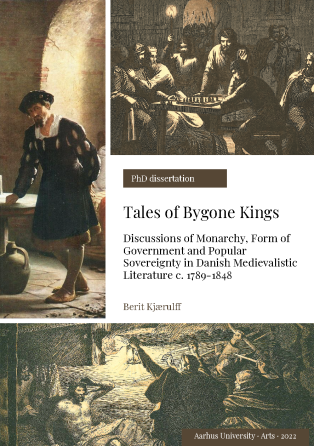Tales of Bygone Kings. Discussions of Monarchy, Form of Government and Popular Sovereignty in Danish Medievalistic Literature c. 1789-1848
Synopsis
This dissertation, entitled Tales of Bygone Kings. Discussions of Monarchy, Form of Government and Popular Sovereignty in Danish Medievalistic Literature c. 1789-1848, studies how Danish fictional literature published between c. 1789 and 1848 used representations of medieval regents to consider political issues pertaining to the absolute monarchy and popular, political agency. The dissertation takes as its starting point an overview of the distribution of publications of this type of literature from the last part of the eighteenth century and the first half of the nineteenth century. I this is identified a tendency that on the whole, fictional literature about Danish, medieval regents are first published in the 1790s, that the frequency of publication drops in the first two decades of the nineteenth century, and that there is a significant increase in the number of publications from the 1820’s and until 1848. The dissertation studies why the publications of fictional literature about medieval regents are distributed in this way and argues that there is a relation between high frequency in publications and periods in which questions about royal power and form of government is more widespread in the Danish public. Following this, the dissertation examines how the literary depictions of medieval regents were used to consider political questions pertinent to royal power in the period
Because of the significant amount of objects of analysis, the dissertation is limited to examine representations of the events in Danish, royal, medieval history, which are most often represented in the literature. The dissertation therefore studies fictional literature about Sweyn Grathe, Canute V and Valdemar the Great; Eric Clipping and Eric Menved; the Interregnum 1332-1340 and Valdemar Atterdag; and Christian II, divided between c. ten novels, twenty plays, some poems and ballets. The corpus for analysis consists of some well-known works, but is mostly comprised of literature that has not or has rarely been studied by researchers.
The dissertation consists of four chapters that examine different political themes, which are prevalent in the studied literature. The first chapter focuses on the first wave of medievalistic literature published over a few years in the 1790s. The chapter analyses the significant influence of republican thought in literature, which is also found in the literature of the nineteenth century, but particularly finds expression in the literature of the late eighteenth century. The chapter consists of analyses of two literary works about the end of the Interregnum; Levin Christian Sander’s play Niels Ebbesen af Nørreriis [Niels Ebbesen of Nörreriis] (1797) and Malthe Conrad Bruun’s ode “Niels Ebbesen, Tyrandræberen” [Niels Ebbesen, the Tyrant Killer] (1797), which both incorporates republican ideas into a fictional, Danish context, but to significantly different effects.
The second chapter deals with ius resistendi, the right to resist an unfit ruler. This was not a theme that was discussed in the public debate of the period, but the theme is quite prevalent in the literature studied in the dissertation. The chapter demonstrates that it is a widespread theme by providing an overview over where and how the theme finds expression in literature and mapping out the different stances towards ius resistendi expressed through different literary works.
The third chapter of the dissertation examines the distribution of political agency between regent and people in the literary works. It shows how the fictional people are provided with a degree of political agency which is significantly greater than that of the contemporary, real Danish people and how the king in some instances – but not all – is reduced to a more politically passive figure. Like chapter two, this chapter consists of selections from a number of literary works which functions to map out the different ways in which the distribution of political agency is dealt with in the literature.
The fourth chapter has a dual but connected aim. It analyses how some of the literature dealt with nationalises the figure of the king so that the king is not only portrayed as a political head of state, but is given a part in the national, popular community. In addition to that, the chapter examines why the large majority of the fictional literature about Christian II is limited to being published in the 1830s and 1849s. The chapter analyses the nationalisation of Christian II in three literary works about the king: Hans Christian Andersen’s play Kongen drømmer [The King Dreams] (1844), Carsten Hauch’s novel Vilhelm Zabern. En Autobiografi fra Christian den Andens Tid [Vilhelm Zabern. An Autobiography from the Time of Christian the Second] (1834) and Ole Bang’s Kongen vaagner [The King Awakens] (1846). The chapter argues that Christian II’s status as a king of the people or king of the burghers makes him an apt figure for discussing inclusion of the people in the government of the country, and that the emotionally controlled nature of the king makes him fit for exploring whether one is necessarily suited for reigning only because one is born to do it. Both are political issues which are highly pertinent to Denmark in the 1830s and 1840s, by when the absolute monarchy had had its day and it was widely acknowledged that the country would soon transfer to constitutional monarchy.
The dissertation comprises a contribution to the understanding of how the Danish literature of the eighteenth and nineteenth centuries facilitated considerations about contemporary political issued, which in the case of the nineteenth century could not be discussed explicitly in public because of the restrictions of the freedom of the press which gave strict limits for public discussion of royal power and the government. The dissertation thereby contributes to expanding the understanding of the public debate and the considerations which preceded the abolition of the absolute monarchy in 1848 and thereby demonstrates how fictional literature provides a fruitful supplement to the description of the political development during the late absolutism offered by historical research.

